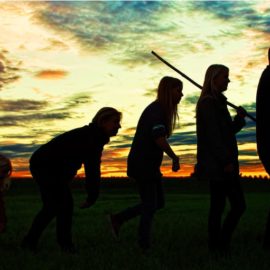

This article is an excerpt from the Shortform book guide to "Antifragile" by Nassim Nicholas Taleb. Shortform has the world's best summaries and analyses of books you should be reading.
Like this article? Sign up for a free trial here .
What is human intervention in evolution? Should humans intervene, and how do we know when we should?
It’s beneficial for evolution to proceed without human intervention since it allows nature to take the best course to create stronger species. However, there are some situations when human intervention can be helpful.
Read more about human intervention and when it should be implemented.
When and How Human Intervention Is Appropriate
All this discussion of modernity and rationalism may have given the false impression that human intervention is always harmful, but that’s not the case. We just need to think more carefully about where, when, and how we intervene.
In medicine, doctors who overprescribe drugs and order excessive tests are over-intervening—and, ironically, under-intervening at the same time—because all that extra work has minimal results. It would be better to save those resources for where intervention is truly needed, like emergency situations.
The general argument here is that some areas need human intervention, while others are harmed by it. For instance, we need strong legal interventions to keep large corporations from ruining both the economy and the environment. However, minor injuries and illnesses don’t need medical intervention, and in fact, seeking it may cause more harm.
So, clearly, the next step is to identify exactly what areas we need to intervene in and when. As a rule of thumb, limiting size, concentration, and speed are helpful methods of harm reduction.
A corporation that gets too big has an unreasonably large impact on the economy; therefore, breaking up monopolies helps keep prices down and wages up. We’ve already discussed how concentrating too much power in one place is dangerous and ultimately harmful (a powerful top-down government versus Switzerland’s collection of local cantons). Finally, imposing speed limits on highway drivers has proven to reduce the frequency and severity of accidents. These are only examples—there are many other ways in which limiting size, concentration, and speed are helpful forms of damage control.
However, while intervening in highway driving has proven to be helpful, intervening in city driving may be just the opposite. A town called Drachten, in the Netherlands, ran an experiment where it removed all of its street signs. Surprisingly, this deregulation actually led to increased road safety. Although, perhaps it isn’t actually surprising, but just an example of the antifragility of attention. Drivers performed better when subjected to the stress of observing and reacting to their surroundings, rather than placidly obeying street signs.
The difference is, again, a matter of speed. Regulations or no, it’s simply not possible to reach highway speeds while driving on surface streets, and therefore highway driving comes with different (and increased) risks.
In short, what we need is a methodical and organized protocol that we can use to determine where, when, and how much to intervene. Given the massive potential (and actual) iatrogenics of modern life—environmental damage, stifled antifragility, and the inevitable threat of nuclear war, to name a few—the time will come when we need to intervene. Intervening in the right ways might be the difference between a living, thriving world and annihilation.
Procrastination as Risk-Management
Given modern humans’ tendency to intervene in everything, we view hesitating to intervene—that is, procrastinating—as some kind of defect or sickness. The supposed “cures” range from changing your environment, to pursuing a new career, to simply powering through it. The problem is compounded by the fact that inaction is hardly ever rewarded; you get a bonus for the problem you solve, not the one that never happens in the first place.
However, in many cases, procrastination is your body trying to tell you something important. For example, an author who procrastinates on writing a book may be doing so because it’s not what he or she should be writing about, either because of lack of expertise or lack of interest. For a more dramatic example, the Roman general Fabius Maximus irritated the conqueror Hannibal to no end by repeatedly delaying and avoiding military engagements that he was sure to lose. In Maximus’s situation, procrastination was the best strategy and indeed the only viable one.
In other situations, most notably emergencies, there’s no sense of procrastination at all. A firefighter doesn’t “get around to” putting out a house fire, and someone who’s severely injured doesn’t put off going to the hospital. When immediate action is needed, people will act.
All of this suggests that procrastination is a natural risk-management mechanism, an ingrained instinct to let antifragile systems work out their own problems. Millions of years of evolution have given us the tendency to procrastinate, so there must be a good reason for it. Usually that reason is not that the procrastinator is defective, but that his or her environment is.

———End of Preview———
Like what you just read? Read the rest of the world's best book summary and analysis of Nassim Nicholas Taleb's "Antifragile" at Shortform .
Here's what you'll find in our full Antifragile summary :
- How to be helped by unforeseen events rather than harmed by them
- Why you shouldn't get too comfortable or you'll miss out on the chance to become stronger
- Why you should keep as many options available to you as possible






